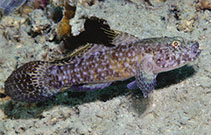| Family: |
Gobiidae (Gobies), subfamily: Gobiinae |
| Max. size: |
6.8 cm TL (male/unsexed) |
| Environment: |
reef-associated; marine; depth range 3 - 37 m |
| Distribution: |
Indo-Pacific: Red Sea south to Bazaruto (Ref. 2798) and eastward to Samoa; north to the Ryukyu Is., the Philippines, Guam and the Marshall Islands. |
| Diagnosis: |
Dorsal spines (total): 7-7; Dorsal soft rays (total): 9-9; Anal spines: 1-1; Anal soft rays: 7-7. Characterized by brown or yellowish brown with scattered pale brown spots on side of body; usually with four diffuse brown bars (below first dorsal, anterior second dorsal, anterior caudal peduncle and on caudal fin base), wavy oblique brown bands on dorsal fins; light and dark spots on all fins except pelvics; dorsal spines tips usually forming short filaments; completely united pelvic fins with well-developed frenum; rounded caudal fin; longitudinal scale series 22-25; cycloid scales on nape, pectoral fin base and breast, becoming ctenoid posteriorly; cheek and opercle with embedded cycloid scales; predorsal scales 6-7; head with prominent papillae ridges; depth of body 4.0 in SL (Ref. 90102). |
| Biology: |
Occurs among corals. |
| IUCN Red List Status: |
Least Concern (LC); Date assessed: 25 June 2018 Ref. (130435)
|
| Threat to humans: |
harmless |
Source and more info: www.fishbase.org. For personal, classroom, and other internal use only. Not for publication.

